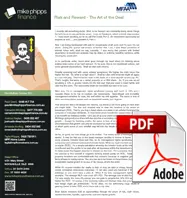I recently did something dumb. Well, to be honest I am constantly doing dumb things but let's focus on one particular event. I was on Facebook, which is dumb step number 1. I was death scrolling, so let us call that Dumb Part 2. An investment opportunity ad popped up and……you guessed it, Part 3.
Now I am being bombarded with ads for investments of all sorts and I'm sure I'm not alone. Being the cynical risk-averse ex-banker that I am, I view these promises of eternal riches with, shall we say, curiosity. I also worry that punters with limited experience in investment analysis may be drawn to enticing headline numbers, while missing the small print.
In no particular order, here's what goes through my head when I'm thinking about putting down some of my hard earned. To be sure, this is not investment advice, just some general observations. Shall we start with returns.
Broadly speaking and with some notable exceptions, the higher the cash return the higher the risk. So, what is a high return? Shall we start with what we might all agree is a low-risk play. That would be cash in the bank on a term deposit at let's say 4%. That's roughly the same as a rental property or a CBA share. So, if you see an ad spruiking a 15% or greater return, it's the first sign that you need to tread lightly and read the fine print. The opportunity might be incredible but best to be sure.
Mind you, I'm in management rights syndicates running well north of 15% and I consider these to be low to medium risk investments. Semi-illiquid and incredibly management sensitive for sure, but well within my risk appetite. The same is true of other accommodation assets such as leasehold motels, but I digress.
How about we dive a bit deeper into returns, coz there's a bit more going on here than you might think. The first and simplest way to view the numbers is via return on investment (ROI). That is, you buy a listed share or a stake in an unlisted fund and the company or trust pays dividends. In most listed share investment cases it also provides a tax benefit via franking credits. Let's say all up your share averages returns circa 7%. All things going well your share will also provide a secondary noncash return via capital growth. Except for franking credits, the same is true of an unlisted trust. In most circumstances that growth can only be accessed as cash once you sell the investment, at which point some of your windfall may fall into the hands of our friends at the tax office.
So far, so good, but now things get a bit trickier. The murky world of leveraged equity awaits. It may be that you or the asset manager decides to borrow to invest. Nearly every property investor does just this, as do management rights syndicates, public companies and unlisted trusts and wholesale funds. What we must now look at is return on equity (ROE). It's a simple calculation whereby the investor looks at the total equity contributed and the profits to be paid after all expenses within the investment are met. In many cases the biggest expense is interest on the loan. For a property investor it's not unusual to find oneself in negative territory based purely on ROE. Sadly, many property investors are comfortable with this scenario because of negative gearing, a fancy phrase for losing money. Yes, you can get a tax break on those losses, but without sustainable capital growth in excess of tax losses, what's the point.
While it's counter-intuitive the reality is that so long as debt is cheap, leverage can create somewhat miraculous outcomes. It can also send you bankrupt if things go sideways or you don't have a plan B. What if we take management rights as an example. The average MLR runs circa 14% ROI. The average cost of debt is say 6%. Put very simply the more 6% money you can grab to acquire the 14% ROI asset, the higher the ROE. Of course, if the economy tanks and interest rates rise, you can see how things might get problematic. To be clear, I'm not advocating crazy levels of gearing, better a lower ROE and a lower risk in my view.

Most astute investors look at opportunities through the prism of risk, cash return, taxation benefits, liquidity, opportunity cost and capital growth. They also tend to invest in asset classes they understand. That's why I'm in management rights syndicates and bank shares, while the managing director is in bottle shops and hardware stores.
While my approach may be conservative, there's actually nothing fundamentally wrong with making a high-risk investment. My concern is that there are too many punters taking that risk without knowing it. The recent spectacular collapse of a number of investment funds has led to the loss of many investor's life savings, and in some cases their entire superannuation. I think a perfect storm of equity access via rising house values, use of SMSFs and so-called sophisticated investors being anything but, has resulted in some very sad stories indeed.
For what it's worth, here's my investment checklist. Use it at your peril !
- Do I understand the asset class?
- What's the best entity to use to invest?
- What are tax implications, both now and when I liquidate the investment?
- Who's managing the show?
- How much proven experience in the asset class do the promoters have?
- Are the advertised returns too good to be true?
- Is the investment liquid or illiquid?
- Is there a ready market for the asset?
- Are returns being quoted as cash or has capital growth been factored in?
- Does projected performance of the asset stack up?
- What else could I be doing with my money compared to this opportunity?
- If I invest, will my portfolio be too heavy in that asset class?
- Have I sought the feedback of an unbiased and experienced advisor?
- What's my exit strategy?
- Does the managing director approve?
Let's be clear (to quote our Prime Minister before being anything but). There is no right or wrong answer to these questions. The important thing is to know the answers and therefore be able to assess the risks. For example, there's nothing wrong with making an illiquid investment provided you don't need the money for the life of the investment. There's nothing wrong with assessing an opportunity predicated on cash returns plus anticipated capital growth. Pretty much everyone who plays the stock market does just that, to say nothing of the property market.
For all you smarties out there I get that this is all very simplified. I could go down the rabbit hole of net present value of future cash flows and internal rates of return, but all I'd prove is my embarrassing lack of an economics degree. We don't want that!
In closing, a few years back I bought shares in a future copper mine. I got a hot tip from a bloke who, it turned out, knew less about copper mines than I did and I knew zero. I sought no other advice, didn't do any real research and went with the vibe. I was in on a sure thing. Turns out I might as well have taken a bag full of $100 bills and set them on fire. At least I would have been warm while I cried into my beer.
See, even geniuses make mistakes.
Mike Phipps F Fin
Director | Phippsfin Pty Ltd
Disclaimer – The writer is not an investment advisor. In fact, he struggles to follow his own advisors. None of the content contained here should be construed as advice. Examples are for illustration purposes only and we encourage anyone considering any form of investment to seek independent expert advice specific to their circumstances. None of this content should be relied upon in any manner whatsoever other than for its entertainment value. Don't even think about it.
No AI or ChatGPT has been used in the writing of this article.







